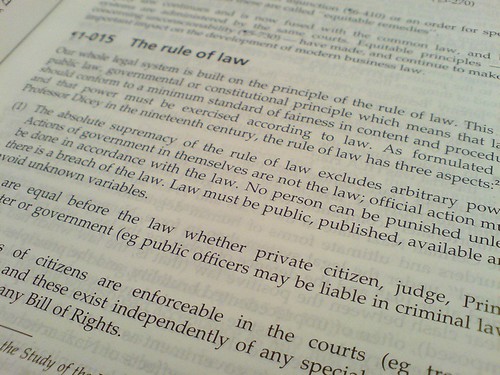
(Photo Source: caliorg)
Disclaimer: the contents of this post DO NOT constitute legal advice. If you suspect that you may have engaged in the unauthorized practice of law, you should immediately seek legal advice from an attorney in your state or jurisdiction.
A common misconception about getting into law school is that legal experience is required. It’s not. But many applicants, laboring under this misconception, tend to exaggerate their legal experience. This is a potentially dangerous idea as it could suggest that the applicant was engaged in the unauthorized practice of law.
What is the Unauthorized Practice of Law?
Although you may have learned quite a bit about the law in undergraduate classes or through work experience, you are not a lawyer until you are admitted to a state’s bar. This means that you should you not provide legal advice or perform legal work for anyone other than yourself.
As noted by a Harvard handbook:
As future practicing lawyers, law students have standards of professional behavior and responsibilities expected of them. Please be advised that every state, including the Commonwealth of Massachusetts, has statutes and rules that prohibit the “unauthorized practice of law.”
The practice of law is broadly defined and can include providing advice, in addition to direct representation. Just as one must get a license to practice medicine, one must be admitted to the bar in a particular state to be able to practice law. Law students are permitted to do legal work for clients as long as the student is working as an individual supervised by an attorney admitted to practice law in the relevant jurisdiction and that attorney takes responsibility for the legal work. Engaging in the unauthorized practice of law may result in criminal penalties, including fines and imprisonment.
To read the American Bar Association’s Model Rule of Professional Conduct prohibiting the unauthorized practice of law, which is adopted by many states, visit: Model Rule 5.5.
What this Means For You
So what does this mean for you and your personal statement? It simply means to be careful about what you write.
For example, it is not uncommon for someone to accompany a family member to court for moral support. Under no circumstances, however, should you write that you gave that person legal advice or appeared on their behalf.
Similarly, if you worked in any legal capacity, including as an intern, paralegal, or secretary for a law firm or state office, do not exaggerate your responsibilities. Do not make it seem as if you, without direct supervision, were representing clients or performing legal work. Do not say that you were “running” the office. You were not the lawyer.
Do not misinterpret this blog post as meaning that you cannot talk about your legal experience. If you have meaningful legal experience, then of course you should write about it. Just be mindful about what you write and how you write it.







